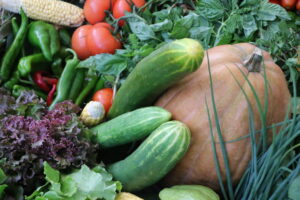
Food that is produced on farms or in gardens that follow organic principals and have not been contaminated with artificial chemicals are what people understand as “organic food”. If a farmer or processor claim their food is organic they should be able to provide customers with evidence their claim is the truth and that they have followed a standard.
The Pacific Organic Standard is tailored to the unique needs of both consumers and producers in the Pacific.
For foods to be labeled as organic under the Pacific Organic Standard, at least 95% of the ingredients must come from organically produced plants and animals. This means that the product must have been produced to these standards and inspected and certified by a POETCom registered certification body, or Participatory Guarantee System. These foods can carry the ‘Organic Pasifika’ certification mark.
Because some ingredients are not available organically, up to 5% ingredients from a list of approved non-organic food ingredients listed in the Pacific Organic Standard are allowed. There are also a limited number of non-food ingredients such as salt, water, and a restricted number of additives and processing aids which are permitted, no artificial colourings or sweeteners are allowed in organic food.
The list of permitted ingredients is extremely strict to ensure that nothing harmful or potentially harmful will be found in organic food.